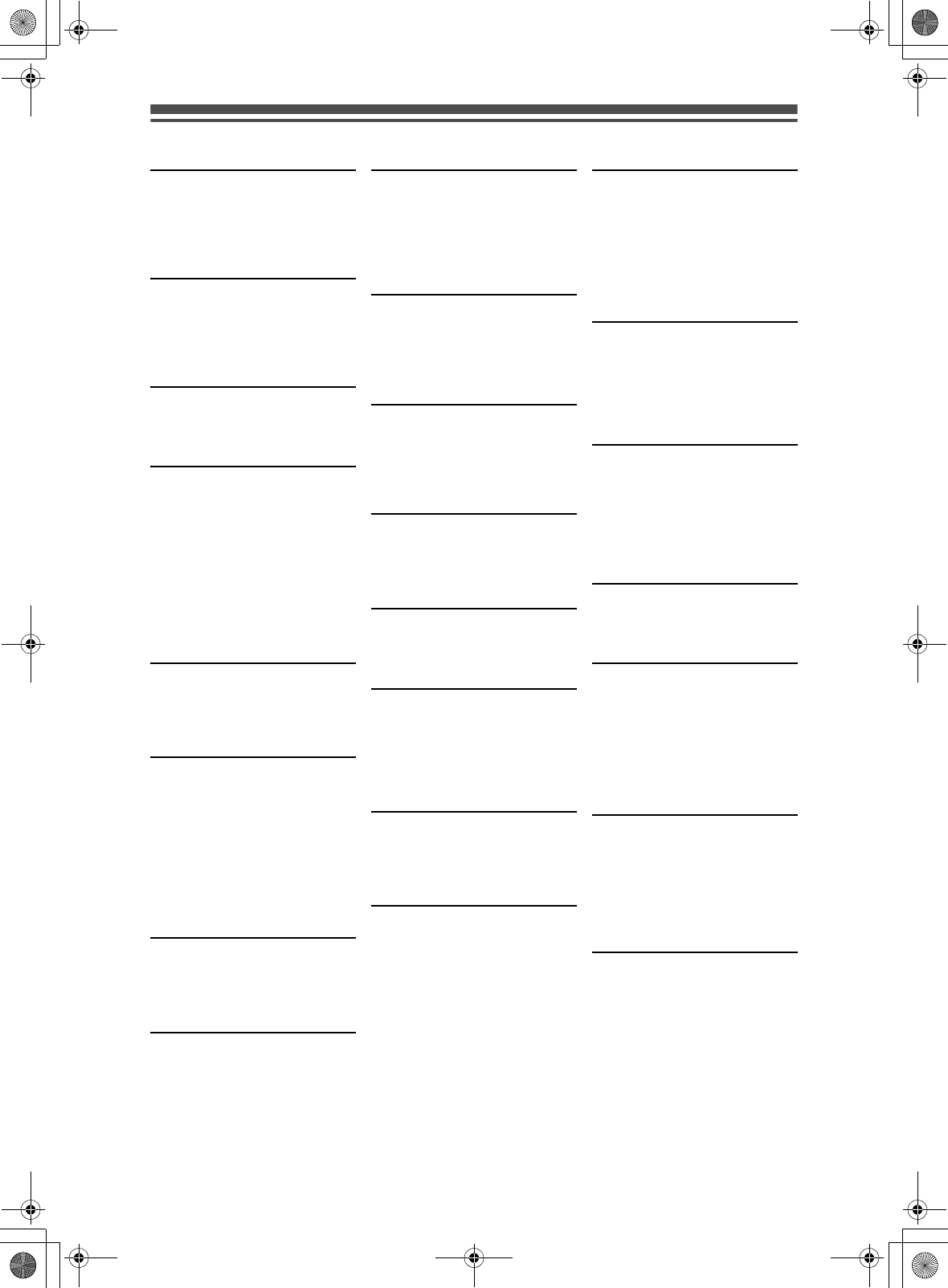
102
EN
Glossary
Analogue audio
An electrical signal that directly
represents sound. In contrast,
digital audio can also be an
electrical signal, but is an indirect
representation of sound. See also
“Digital audio”.
Aspect ratio
The width of a TV screen relative to
its height. Conventional TVs are 4:3
(i.e., the screen is almost square).
Widescreen models are 16:9 (the
screen is almost twice as wide as its
height).
Chapter
Just as a book is split up into
several chapters, a title on an HDD/
DVD is usually divided into
chapters. See also “Title”.
Component video output
Each signal of luminance(Y) and
component (P
B
/C
B
, P
R
/C
R
) is
independent to output so that you
can experience picture colour as it
is.
Also, due to compatibility with
progressive video (576p/480p), you
can experience higher-density
picture than that in interlace (576i/
480i).
CPRM
(Content Protection for
Recordable Media)
CPRM is a scrambling copy
protection system for the protection
of “copy-once” broadcast
programmes (e.g. some satellite
broadcasts).
Digital audio
An indirect representation of sound
using numbers. During recording,
the sound is measured at discrete
intervals (44,100 times a second for
CD audio) by an analogue-to-digital
converter, generating a stream of
numbers. On playback, a digital-to-
analogue converter generates an
analogue signal based on these
numbers. See also “Sampling
frequency” and “Analogue audio”.
Dolby Digital
A system developed by Dolby
Laboratories that compresses
digital sound. It works with stereo
(2ch) or multi-channel audio.
DTS
(Digital Theater System)
DTS is a multi channel surround
sound system. By connecting to
DTS decoder, you can enjoy
dynamic and realistic sound like
movie theatre. DTS surround sound
technologies were developed by
DTS, Inc.
Finalise
To make DVDs that have been
recorded playable in DVD players. It
is possible to finalise DVD-RW/-R
and DVD+RW/+R discs with this
unit.
HDMI
(High Definition Multimedia
Interface)
A digital interface between audio
and video source. It can transmit
component video, audio, and control
signal with one cable connection.
JPEG
(Joint Photographic Experts
Group)
JPEG is a method of compressing
still image files. You can copy JPEG
files on CD-RW/-R discs from a
computer and play back the files on
this unit.
MP3
(MPEG Audio Layer 3)
MP3 is a method of compressing
files. You can copy MP3 files on
CD-RW/-R discs from a computer
and play back the files on this unit.
PBC (Video CD only)
(Playback Control)
This function enables you to play
back interactive software using a
menu screen. See also “Title”.
PCM
(Pulse Code Modulation)
PCM is a format that converts audio
into digital data. It is mainly used for
Audio CDs and DAT. This unit can
play back sounds as realistic as
possible by converting even
compressed Dolby Digital and
MPEG audio to PCM.
Playlist
From this list, you can play back
contents of a disc in your desired
order or in sequence. It is also
possible to directly search for a
specific scene.
Progressive Scan (576p/480p)
A type of display that does not split
each frame into fields, and instead
scans directly through all the
scanlines of each frame in order.
Progressive Scan provides less
flickering and higher image
resolution than traditional (576i/
480i) TV signals. Refer to pages 20
to 21 and 90 for instructions on the
Progressive Scan mode selection.
Region code
Regions associate discs and
players with particular areas of the
world. This unit will only play back
discs that have compatible region
codes. You can find the region code
of your unit by looking on the rear
panel. Some discs are compatible
with more than one region (or all
regions).
Sampling frequency
The rate at which sound is
measured by a specified interval to
turn it into digital audio data. The
number of samples in one second is
defined as the sampling frequency.
The higher the rate is, the better the
possible sound quality.
Title
(HDD/DVD)
A collection of chapters on an HDD/
DVD. See also “Chapter”.
(Video CD)
The contents of a Video CD. When
playing back a Video CD with the
PBC function, the Title Menu will
appear automatically.
Track
Audio CDs and Video CDs use
tracks to divide the contents of a
disc. The DVD equivalent is called a
chapter. See also “Chapter”.
Video mode
Video mode is the same recording
format as used on the DVD-Videos
you purchase in local shops. You
can play back the discs recorded in
this format in most DVD players,
however it offers only limited editing.
You will need to finalise discs
recorded in Video mode before
playing them back on other unit.
VR mode
A basic recording format for
DVD-RW. VR mode offers advanced
editing, and you can record and edit
material repeatedly, however it is
playable only on VR mode
compatible unit. Finalisation is
recommended before playing them
back on other unit.
+VR mode
A recording format for DVD+RW/+R.
+VR mode offers basic editing, and
it is playable on most DVD players.
Finalisation is recommended before
playing them back in other unit.
E3NG0FD_EN.book Page 102 Wednesday, January 30, 2008 10:37 AM


















